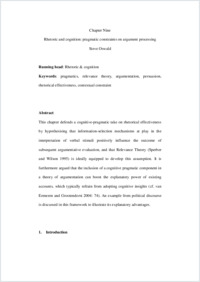Rhetoric and Cognition: Pragmatic Constraints on Argument Processing
BLE-BLL
- Oswald, Steve ORCID University of Fribourg
- 20.10.2016
Published in:
- Relevance Theory: Recent developments, current challenges and future directions / M. Padilla Cruz (Ed.). - John Benjamins Publishing Company. - 2016, vol. 268, p. 261-285
English
This chapter defends a cognitive-pragmatic take on rhetorical effectiveness by hypothesising that information-selection mechanisms at play in the interpretation of verbal stimuli positively influence the outcome of subsequent argumentative evaluation, and that Relevance Theory (Sperber and Wilson 1995) is ideally equipped to develop this assumption. It is furthermore argued that the inclusion of a cognitive pragmatic component in a theory of argumentation can boost the explanatory power of existing accounts, which typically refrain from adopting cognitive insights (cf. van Eemeren and Grootendorst 2004: 74). An example from political discourse is discussed in this framework to illustrate its explanatory advantages.
- Faculty
- Faculté des lettres et des sciences humaines
- Department
- Département d'anglais
- Language
-
- English
- Classification
- Language, linguistics
- License
-
License undefined
- Open access status
- green
- Identifiers
-
- DOI 10.1075/pbns.268.10osw
- ISSN 0922-842X
- Persistent URL
- https://folia.unifr.ch/unifr/documents/323820
Statistics
Document views: 71
File downloads:
- osw-ch9: 181
